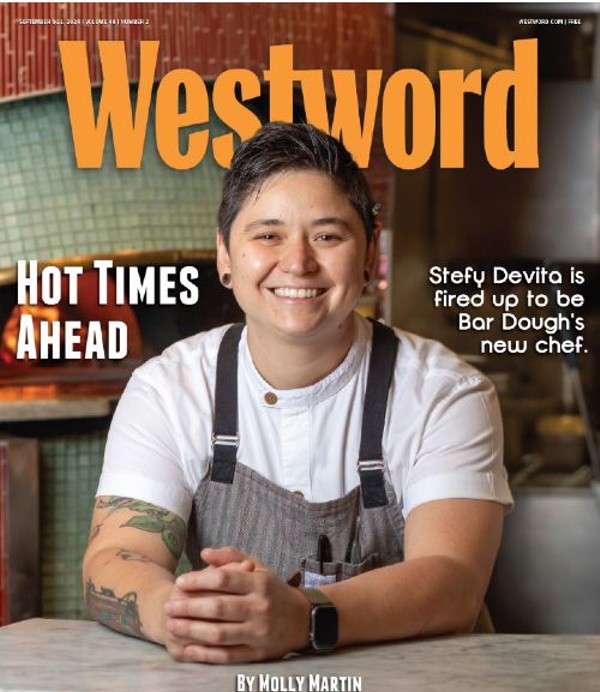As a result, if you persist in asking him bullshit questions, you will be rattled. Not because of the 38-year-old's spectacularly intense gaze (the dominant image of such diverse films as Something Wild and Dominick & Eugene and GoodFellas), and certainly not because he's overbearing or rude (unfailingly polite and respectful, he is the perfect gentleman), but because Ray Liotta comes across as a man who understands his industry and his craft completely and expects the same of anyone who shares space with him.
Hawking his first starring role in a big-budget fantasy movie--as Robbins, the mysterious hero of the futuristic prison flick No Escape--Liotta's famous demonic laugh ("HehHehHehHehHehHEHHHHHH) is nowhere in evidence. Perched on the edge of a sofa in a downstairs room of the Hotel St. Germain in Dallas, where he's staying during a promotional visit to the USA Film Festival, he is relaxed but not exactly easygoing. Trot out the standard personality-profile questions (where did you grow up, what were you like in school, what was your first profound moviegoing experience, if you could be a tree what kind of tree would you be) and he smiles ruefully, then declines to answer.
Ask a truly irrelevant question, and his already piercing blue eyes seem to light up with near-nuclear intensity. It is possible, of course, that the man is a softhearted little pussycat who also happens to be a convincing actor. But Liotta gives no outward hint that this is the case: face to face, from first moment to last, he locks eyes with you like a man interviewing for a position as chief agony foreman in Hell. Norman Mailer, biographer of executed Utah murderer Gary Gilmore, once said that he never felt certain that he had looked into the eyes of a born killer until he shook hands with Burt Lancaster. Ray Liotta's gaze brings that anecdote to dizzying new life.
When pressed, Liotta will, in fact, play the game--not because he enjoys it, but because it's part and parcel of the Hollywood PR circuit, which, more than any other factor except word of mouth, determines whether a film becomes a smash or a dud. And in the process of playing the game, Liotta does not participate in the illusion that an interviewer can spend ten minutes at a roundtable discussion or thirty minutes in a hotel room with him and come away understanding what makes him tick.
"I read profiles of me where the writer comes up with all kinds of stuff that I didn't mean to convey, and analyzes me up and down in ways that have nothing to do with who I really am," he says. "It makes me wanna find the guy and get in his face and yell, `Hey, man, fuck you, all right? You wanna know me? Walk around in my skin for 38 years. Then you're qualified to say shit. Not before.'"
Liotta concedes that he is known as a loner in the industry. He likes it that way--not because he's a snob, but because he thinks his childhood buddies from his hometown of Union, New Jersey, and from his struggling soap-star days in New York City on "Another World," are more fun to be with and a lot better adjusted. "I basically have one best friend, one guy I hang with all the time, and that's a guy I was on the soap with," he says. He does not offer the best friend's name, and his face indicates that he would not give it if asked. (Nor is he interested in specifying in which city "back east" he now resides. "I could tell you where Mr. Liotta currently lives," a Savoy Pictures flack said, "but then I'd have to kill you. Seriously, though--he does not release that information...) However, Liotta is upfront, even cynical, about his motivation for appearing in No Escape. It's mostly financial.
As if he needed to admit this: Produced by action vet Gale Anne Hurd (who brought us both Terminator movies) and helmed by British slickster Martin Campbell (Criminal Law), the film is handsomely produced, edited and photographed, but shoddily conceived--an overscaled, underwritten "B" picture. It starts out promisingly, with the hero, Robbins, a renegade military officer who killed his commander over an undefined dispute, arriving at a corporate-run prison where even thoughts are monitored.
But shortly thereafter, Robbins is sent to a remote tropical island where the worst of the worst are dropped into the brush and expected to fight for survival against gangs of felons. The setup is a blatant reworking of Road Warrior: a gang of seminomadic evil characters (dressed in dark colors) keep trying to take over a small colony of hardworking, fair-playing, freedom-dreaming good characters (dressed in light colors). Like Mad Max, Robbins wants to be left alone, but he eventually gives in and helps the good guys fight the bad guys, and in the process, lets us see just a bit of his carefully guarded humanity.
The best reason for seeing it is Liotta's performance. His sleek, menacing physicality augmented by a brand-new, rock-hard body (courtesy of the same trainer who pumped up Linda Hamilton for Terminator 2), Liotta is righteousness incarnate--a freshly minted action icon, darting catlike from one shot to the next and putting the spookiest gaze in the business to fascinating use. He is so effective at communicating Robbins's alienation and inner turmoil that when the script finally forces him to explain himself, the ensuing speech seems redundant. The discrepancy between what No Escape does for Liotta and what he does for it is downright embarrassing.
Which is par for the course. With few exceptions, Liotta always has been the best thing in his own movies--an ennobling presence who can make mediocre pictures like Article 99 bearable and great films like GoodFellas greater still.
Many movies released during the 1980s chronicled the desire of "civilized" people to embrace and understand the dark side of life. But along with Blue Velvet, only Jonathan Demme's Something Wild made that darkness visible, even palpable. In his screen debut as Ray, the cackling, pumped-up ex-felon who turns everybody else's life upside down, Liotta was a hammerhead shark in a tank full of angelfish--everything Demme had hoped for, and then some.
"I guess I was too right for that role," Liotta says. "I read some reviews and other pieces where the writers seemed to think I was an actual ex-con who got out of the joint and took some acting classes."
Demme later admitted that, after test screenings, he cut the film's climactic home invasion sequence in half--because Liotta's overpowering rage unbalanced the movie's farcical tone and made the prospect of good triumphing over evil seem ludicrous.
In Field of Dreams, Liotta made Shoeless Joe's ghost seem more real than most of the living characters by articulating, with the barest minimum of dialogue, the man's fanatical love for baseball, his burning desire to shield it from those who did not understand its importance. Liotta's finest moment in that film occurred when Shoeless Joe told the hero, Ray Kinsella (Kevin Costner), that he couldn't go into the cornfield with the great novelist Terence Mann (James Earl Jones), and the bewildered Ray demanded to know why. "Because you're not invited," Joe replied. His blazing eyes seemed to add: And you'd better not ask me again.
"There's a reason why I've only been in eight movies," Liotta says, counting the yet-to-be-released Whoopi Goldberg drama Corrina, Corrina, about a widower who fails in love with his child's nanny, as the eighth. "I only take a part if I think the character is somebody I haven't played before, or the movie is part of a genre I haven't worked in before. Robbins in No Escape intrigued me because he was totally physical. He was quiet and withdrawn. He was a loner. He wasn't impossible to get along with, but at the same time, he was not to be fucked with.
"I make the process sound really important and complicated, but hey, this isn't Ordinary People, right? I mean, this is the kind of movie where one guy gets beheaded and another guy gets hit with a flaming arrow in the mouth. I don't have any illusions about it. It is what it is, you know? I did this movie because the people who made it have a good track record with this kind of project. But mostly I did it because although I already have the respect of the industry as an actor, I haven't proved that I can open a movie--that my name can sell tickets and make for a big opening weekend. That's what you have to do in this business to get where you want, to get access to the kinds of parts you want."
But the parts he wants aren't generic action-hero roles.
"I don't want to be one of those guys like Schwarzenegger, who basically plays the same character in every movie, but wears different clothes," he says, "That kind of thing would get boring fast--for me, and also for the audience. Look at somebody like little Tommy Cruise. Pretty much all of his movies come down to the same thing: He's a shallow young guy with blow-dried hair, he gets into a little bit of trouble, and he smiles his way out of it."
Liotta's most revealing admission is that he has little interest in seeing his movies after they're completed.
"I've seen most of the films I've been in maybe once or twice, and that's it," he says. "As an actor, you're basically a cog in the machine. You do your bit, it's over, and you move on. The best part of it for me isn't the premiere or the press tour or reading reviews or talking to Letterman or whatnot. It's the acting. What I live for is that moment when you disappear and all of a sudden you're not you anymore--you're somebody else. That feeling you get when everything clicks. That rush. That sensation.
"If there's a common thread running through all the guys I've ever played, it's that they all have one thing, just one thing, that they really love and really want--the thing that drives them. In Something Wild, he wants his wife back. In Article 99, he wants to treat patients without bureaucrats getting in the way. In Field of Dreams, the guy wants to play baseball so bad that not even being dead can stop him. In GoodFellas, the guy wants money and power. In No Escape, he wants his freedom."
If No Escape becomes a hit, and Liotta gets the artistic freedom and financial clout he obviously craves, will he circulate more in Hollywood? Appear on talk shows more often? Live the high life? Or will he continue his monklike devotion to his one thing--acting?
"Well, I'm not gonna become a partner in Planet Hollywood, if that's what you mean," he says, chuckling.
Matt Zoller Seitz is a staff writer for the Observer, Westword's partner paper in Dallas. Bill Gallo is on vacation.











